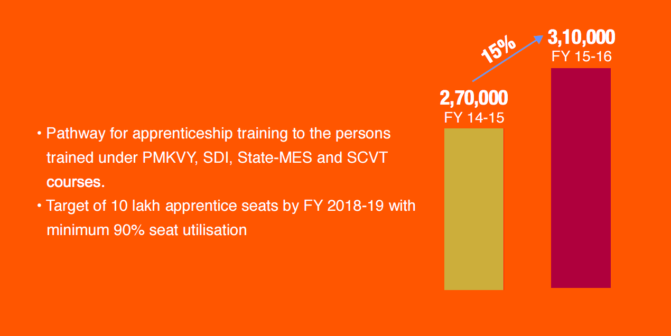According to the latest notification (19th August 2016) on the guidelines for National Apprenticeship Promotion Scheme (NAPS), the government targets to provide apprenticeship training to 50 lakh youth by 2020. Under the scheme, Government of India will share 25% of prescribed stipend subject to a maximum of Rs. 1500 per month per apprentice with the employers. Government of India will also share maximum Rs.7500 per fresher apprentice (without any formal trade training) as a cost of basic training with Basic Training Providers. The scheme will commence from 1st October, 2016. Employers who have engaged the apprentices before 1st October, 2016 will get the benefits of scheme from 1st October, 2016 only.
”All you wanted to know about…” is a knowledge series on skill development and employment brought to you by LabourNet Services India Pvt Ltd in partnership with National Skills Network (NSN).
Apprenticeship provides the much needed window to consolidate unorganised ways of working and aim for better matching of job aspirations with the outcome of skill development. If implemented strategically, it may transform the unorganized or the informal sector through mutual benefits for the employer, the employee and the training organisations. As we look into the possible issues that need to be dealt with, some questions need to addressed immediately.
How do ensure that the benefits of National Apprenticeship Promotion Scheme (NAPS) reaches the MSMEs and stakeholders operating at bottom of the pyramid? What are the ways in which the chela (novice) who is working under the ustad (expert) in a roadside auto mechanic shop or the kaarigar (craftsperson/artisan) working under the master in learning a craft gets absorbed in a more organised and sustainable model of learning and earning? What is the best way to align prior learning (RPL) with a long term goal in upskilling and employability?
 Traditionally, manufacturing industries have been successful in getting the best out of apprentices by giving them practical experience in the real working environment. For example, a qualified machine operator could not only gain workplace skills in addition to technical skills and rich knowledge, but enhance his market value by 3 times after completing the prescribed apprenticeship period. Even, if the person is not absorbed in the industry for some unavoidable reason, he or she could explore options for self-employment or entrepreneurship. Let’s look at the seven ways to get started with successful implementation of National Apprenticeship Promotion Scheme (NAPS) in the unorganized sector.
Traditionally, manufacturing industries have been successful in getting the best out of apprentices by giving them practical experience in the real working environment. For example, a qualified machine operator could not only gain workplace skills in addition to technical skills and rich knowledge, but enhance his market value by 3 times after completing the prescribed apprenticeship period. Even, if the person is not absorbed in the industry for some unavoidable reason, he or she could explore options for self-employment or entrepreneurship. Let’s look at the seven ways to get started with successful implementation of National Apprenticeship Promotion Scheme (NAPS) in the unorganized sector.
1.The Micro, Small and Medium Enterprise (MSME) challenge
Various micro, small and medium enterprises still work with unskilled or semi-skilled workforce. For them hiring trained people is not a priority as they are able to meet their needs without bearing the cost of trained people. But, they are not aware of how their output remains below quality and standards. It may be a challenge to convince them about taking apprentices on board; however with systematic education about long term benefits and incentives they can be brought into the fold.
2. Apprenticeship norms should be relaxed
The legal aspect of Apprenticeship which could work against its larger acceptance are already being re-looked at (reference to Apprenticeship Protsahan Yojana). What we need is a friendly approach that benefits the industry, the training partners and the candidates to adopt apprenticeship models without the fear of tough labour laws, unnecessary paperwork and over-regulation.
3. Not limited to manufacturing sector
The popular notion of apprentices being attached to the manufacturing sector limits its scope as a means for organised sector employment, particularly through the services industry. Today, we have apprentices working in customer service, sales, logistics and other sectors.
4. Apprentices are not cheap labour
Even though the employers are not bound to pay them benefits like PF or ESI, there has to be a minimum stipend during the training period with access to facilities like accommodation, travel when needed.
5. Opportunity to leverage existing infrastructure
Not all technical training institutions like ITIs or RVTIs can afford to purchase latest equipment, tools and technology. Apprenticeship helps skilled workers in upgrading their practical knowledge and being equipped with current industry standards.
Highlights of National Apprenticeship Promotion Scheme (NAPS)
- Aims at training50 lakh youths by 2019-20 at an estimated cost of Rs 10,000 crores
- Offer financial incentives to employers to engage apprentices – help create job opportunities 12 million people who enter the workforce every year
- Mandate the profit making Public Sector Units (PSUs) to scale up apprenticeships, up to 10% of total manpower, over the course of this year
- While bearing 50% of training cost, implemented by DGT under MSDE, requires government to contribute 25% per cent of the total stipend payable to an apprentice directly to the employers, subject to a maximum of Rs.1500 per month per apprentice
- Maximum of Rs.7,500 per apprentice for their academic training will be of one-fourth duration of the apprenticeship training.
- 50% of the total expenditure incurred on providing basic training would be supported by government,
- Work proactively with the industry including MSME to facilitate tenfold increase opportunities in the country by 2019-20. Currently training is being imparted to over 2.5 lakh apprentices.
- Maximum permissible apprentices – 10% of employee strength
6. Explore interoperability with quality frameworks
Candidates who have qualified for various NSQF levels or acquired skills through the MES courses can shown a longer path for upskilling and employability. This will provide avenues for enhancing the scope of short term training through schemes like PMKVY to include flexible learn and earn options.

7. Awareness and education among youth
How do we make being an apprentice aspirational? Apprenticeships can be as powerful as internships, if promoted in the right way. It cannot be limited to ITI or polytechnic students. Candidates from short term training programs like PMKVY or state skill development missions should be able to avail apprenticeship options for upskilling themselves
We need to explore flexible and interoperable ways of integrating apprenticeship with existing training and skill development schemes. This is the best way enhance the value of skilled jobs and promote different paths to sustain the impact of skill based training among youth.
















[…] Click here to know about 7 ways to successfully implement National Apprenticeship Promotion Scheme (… […]
Kya ITI Holders (NAPS) main Apprenticeship training kr skty hai ?
Kya ITI Holders (NAPS) main Apprenticeship training kr skty hai ?
[…] Click here to know more about National Apprenticeship Promotion Scheme […]
What is the difference between NATS and NAPS
Hi Uday,
the name itself tells that National Apprenticeship Promotion Scheme(NAPS) is an apprenticeship promotion scheme which is established to promote apprenticeship training. Whereas National Apprenticeship Training Scheme(NATS) is a scheme where young, technically qualified people undergo training under a Master Trainer to become equipped (trained) for jobs in the Modern Scenario.
Hi Ms. Madhuri,
as per below marked statement notified by Government -minister of government skill development dated 1st october’2019.
*This scheme will cover all categories of apprentices except apprentices which are
covered under National Apprenticeship Training Scheme (NATS) administered by
Ministry of Human Resource Development.
Kindly help to understand why NATS not covered under NAPS, If there is MSDE also available for Graduate apprentices why should choose NATS where no incentive plan.
Thanks !
Is IT companies are eiligilbe for MAPS
Yes If you need more info write to us at contact@nationalskillsnetwork.com
Sir NAPS AND NATS SAME SCHEME
Hi can i know about the future of NAPS apprenticeship
1.Do they get permeant job in the same Company
2.What about there increment facility , is there any increment for them?
3.After completing the certain period do the certificate will get value for any government jobs?
PLEASE GIVE ME A REPLAY FOR THIS